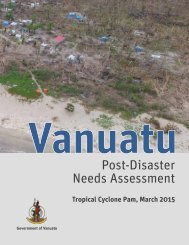Fiji
yqgk302EGjo
yqgk302EGjo
Create successful ePaper yourself
Turn your PDF publications into a flip-book with our unique Google optimized e-Paper software.
FIJI Post-Disaster Needs Assessment<br />
the poverty line (F$55.12 and F$49.50 per adult equivalent per week for urban and rural respectively). Data suggests that<br />
some 90 percent (485,030) of the affected population has suffered and may continue to suffer income loss, falling below<br />
the poverty line, into the emerging poor group. Currently, the government’s Social Protection Programme supports a little<br />
over 200,000 beneficiaries. Despite measures, such as the housing grant, which was provided to some 35,000 people<br />
in the amount of F$5,000, and withdrawals granted to 135,000 people, both from the FNPF, the government may still be<br />
confronted with an additional 33 percent of the population seeking assistance, in addition to its normal beneficiaries.<br />
Despite the injection to the economy of some F$250 million and assurances given that the FNPF is strong (with a reserve<br />
of some F$5 billion), the withdrawal of money may have a long-term impact on the Fund’s viability and a reduction in the<br />
volume of pensions, which participants may receive in the future.<br />
Micro, small and medium enterprises may be at risk of losing momentum and entrepreneurial confidence due to the extent<br />
of damage and change in economic flows suffered as a result of TC Winston. This will impact the ability of the local private<br />
sector to lead much-needed employment creation and local economic growth in the affected areas and informal sectors.<br />
2.2.4 Recovery Strategy and Needs<br />
In addition to the immediate measures undertaken since TC Winston, such as the implementation of a Community Based<br />
Emergency Employment programme, 41 which includes cash for work, farming tools, health and safety training, social<br />
security link to FNPF, child labour awareness, link to overseas seasonal work and other social programmes, more must be<br />
done. Recovery needs are estimated at F$31.5 million, as set out in Table 12. The following are a brief outline of policies,<br />
which seek to address the medium- and long-term impacts of TC Winston.<br />
Employment and Livelihoods<br />
A task force may be established to review, develop and implement a comprehensive and innovative response programme<br />
for the medium and long term to support disenfranchised informal and subsistence workers in rural areas. This should result<br />
in the development of an informal economy policy based on a robust database in order to inform targeted interventions to<br />
empower the informal economy and lead to increased formalization of micro and small enterprises. Such a process should<br />
be facilitated through simpler registration procedures, coupled with formalization incentives (e.g., eligibility for subsidies<br />
and credit).<br />
The register of people seeking employment should facilitate a ready-to-work pool, available for deployment for employment<br />
intensive infrastructure programmes as significant volumes of employment can be created during the reconstruction of<br />
public and community infrastructure. Women and youth must be trained in non-traditional skills for ready absorption into<br />
the construction sector during this phase and people with disabilities should be included as well.<br />
The development of agricultural insurance may be considered to reduce the risk of shocks experienced by disaster. In order<br />
to meet the major institutional and technical/operational challenges, such a package will require collaboration between the<br />
government, the Insurance Council of <strong>Fiji</strong>, farmer cooperatives, the microfinance and banking sectors, and development<br />
partners.<br />
The development of an enterprise recovery programme with a robust public-private partnership should ensure that<br />
enterprises restart and consequently regenerate employment.<br />
Social Protection<br />
An analysis of the proportion of households in the PBS that was previously just above the poverty cut-off score, but as a<br />
result of TC Winston has drifted below, should be undertaken. The Department of Social Welfare has begun a process of<br />
consolidating and centralizing the PBS Registry, which will be useful for this purpose, and estimates a recovery budget of<br />
F$7 million for the recovery period for the expansion of current social protection programmes.<br />
The impact of the top-up transfers delivered through the three core social assistance programmes in response to TC<br />
Winston should be assessed, which will help inform future post-disaster cash transfer initiatives.<br />
The emergency employment programmes or skills development trainings designed for immediate livelihood and income<br />
generation should be targeted towards the pro-poor beneficiaries who are part of the PBS (10,931 households in the 12<br />
severely affected areas), ensuring inclusiveness in terms of gender and people living with disabilities (PLWD).<br />
A review of existing social protection measures and the development of policies for use in future disasters, as the basis for<br />
the development and approval of informed social protection legislation, should be undertaken.<br />
41<br />
This pilot programme is implemented by the Ministry of Employment, Productivity and Industrial Relations and supported by the National<br />
Disaster Management Office (NDMO) and the MOA through the Food Security and Livelihoods Cluster<br />
Tropical Cyclone Winston, February 20, 2016<br />
35



